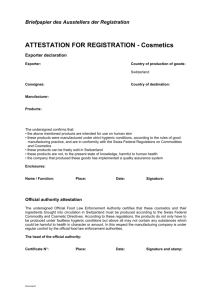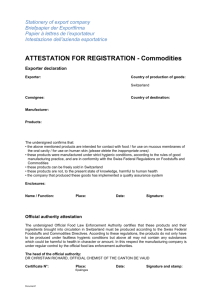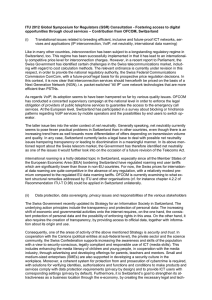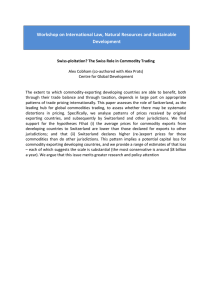2014 Global Symposium for Regulators
advertisement
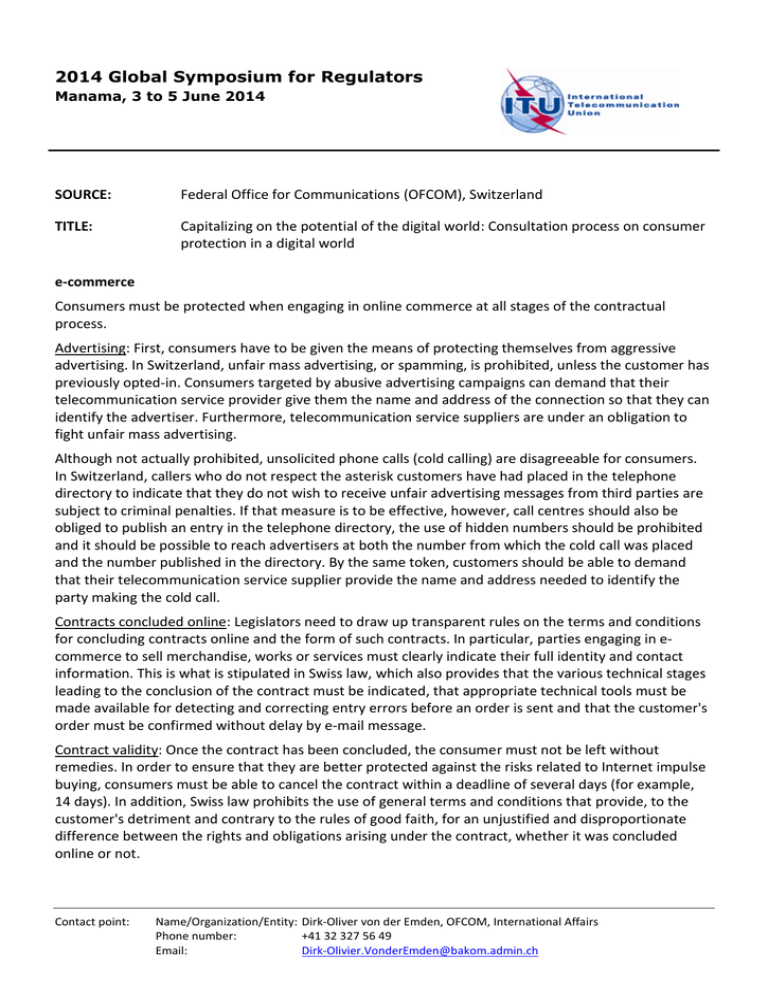
2014 Global Symposium for Regulators Manama, 3 to 5 June 2014 SOURCE: Federal Office for Communications (OFCOM), Switzerland TITLE: Capitalizing on the potential of the digital world: Consultation process on consumer protection in a digital world e-commerce Consumers must be protected when engaging in online commerce at all stages of the contractual process. Advertising: First, consumers have to be given the means of protecting themselves from aggressive advertising. In Switzerland, unfair mass advertising, or spamming, is prohibited, unless the customer has previously opted-in. Consumers targeted by abusive advertising campaigns can demand that their telecommunication service provider give them the name and address of the connection so that they can identify the advertiser. Furthermore, telecommunication service suppliers are under an obligation to fight unfair mass advertising. Although not actually prohibited, unsolicited phone calls (cold calling) are disagreeable for consumers. In Switzerland, callers who do not respect the asterisk customers have had placed in the telephone directory to indicate that they do not wish to receive unfair advertising messages from third parties are subject to criminal penalties. If that measure is to be effective, however, call centres should also be obliged to publish an entry in the telephone directory, the use of hidden numbers should be prohibited and it should be possible to reach advertisers at both the number from which the cold call was placed and the number published in the directory. By the same token, customers should be able to demand that their telecommunication service supplier provide the name and address needed to identify the party making the cold call. Contracts concluded online: Legislators need to draw up transparent rules on the terms and conditions for concluding contracts online and the form of such contracts. In particular, parties engaging in ecommerce to sell merchandise, works or services must clearly indicate their full identity and contact information. This is what is stipulated in Swiss law, which also provides that the various technical stages leading to the conclusion of the contract must be indicated, that appropriate technical tools must be made available for detecting and correcting entry errors before an order is sent and that the customer's order must be confirmed without delay by e-mail message. Contract validity: Once the contract has been concluded, the consumer must not be left without remedies. In order to ensure that they are better protected against the risks related to Internet impulse buying, consumers must be able to cancel the contract within a deadline of several days (for example, 14 days). In addition, Swiss law prohibits the use of general terms and conditions that provide, to the customer's detriment and contrary to the rules of good faith, for an unjustified and disproportionate difference between the rights and obligations arising under the contract, whether it was concluded online or not. Contact point: Name/Organization/Entity: Dirk-Oliver von der Emden, OFCOM, International Affairs Phone number: +41 32 327 56 49 Email: Dirk-Olivier.VonderEmden@bakom.admin.ch 2 Disputes: In the event of a dispute, consumers find it difficult to place the matter immediately before a civil court because of the length and cost of the proceedings. Alternative mechanisms (conciliation, arbitration) should therefore be introduced for settling disputes, so that consumers can defend their rights rapidly and at a lower cost. Consumer information: The State should spare no effort in providing consumers with all the information they need to be informed e-commerce participants. In Switzerland, for example, the federal administration has drawn up guidelines for online purchases, the Guide des achats en ligne, in French, German and Italian and in cooperation with the parties concerned.1 Social media In recent years, social media such as Facebook, Twitter and Instagram have grown exponentially worldwide. Estimates put the number of Facebook users alone at between 1.3 and 1.5 billion people at the end of 2013. Social media have substantial economic, social and political potential; they play a role, for example, in democracy-building processes. A relatively recent phenomenon, social media are also a source of many regulatory problems. In Switzerland, the protection of children and young people is a priority on the political agenda. Legal aspects: Swiss telecommunication law, like comparable legislation in other countries, was drawn up at a time when the provision of telecommunication services still depended on the possession of a specific network designed for that specific purpose, or on authorized access to such a network. With developments in technology, the link between network and services has disappeared. Today, services may be provided by various means; they may even be provided by social media without the active participation of network operators. Should platforms such as Facebook and Twitter therefore be regarded as telecommunication service providers? To what rights and obligations should they be subject? These are pending legal questions that need to be discussed at international level as well. Lack of data control and transparency: The fact that users lose almost all control over their data when they use social networks is a serious problem. The Council of Europe Committee of Ministers2 recommends that platform operators engage in more transparent data processing, obtain the consent of the persons concerned and clearly indicate to users whether or not their communications are private or public. Users should be able to make informed decisions about the degree to which their data can be accessed by others. Social network operators should not collect or process data from non-members and should use a configuration and software that respect user privacy. In addition, users should undertake not to publish content on other people unless the latter have given their consent. These recommendations could be implemented internationally as a form of industry self-regulation, for example a code of conduct. Platforms that try to keep their customers by blocking the transfer of personal data to a competitor are another instance in which users have found they have no control over their data. In future, it will probably become necessary to introduce legislation on data transfers or to regulate the interfaces between social network platforms. 1 www.e-commerce-guide.admin.ch 2 Recommendation CM/Rec(2012)4 of the Council of Europe Committee of Ministers, of 4 April 2012, on the protection of human rights with regard to social networking services. P:\SRU_ADM\GSR\GSR2014\Consultation\contributions\GSR14 Contribution_OFCOM_Switzerland.docx 09.05.14 09.05.14 3 Aspects relating to the protection of children and young people: Social networks expose children and young people to specific risks, notably in terms of adult-only content and sexual predation by third parties. Because they do not have the requisite technical knowledge and are not really aware of the problem, young people are not always able to protect themselves against the risks related to problematic contacts or the transmission of personal data. The Internet never forgets; the permanency of data is a problem that children and young people are unable to gauge correctly. Often, the adults around them - their parents or teachers, for example - also lack the experience and technical knowledge needed to alert them to the risks of social media. Legal tools do not suffice to protect children and young people. They need to be supplemented with a series of measures that include public advocacy, content alerts and self-regulation initiatives in the industry. At the same time, the media savvy of children, young people, parents and teachers needs to be improved. Such measures must be drawn up using an interdisciplinary approach and must be complementary so as to create a coherent general framework. International cooperation In a globalized digital environment, the best national consumer protection measures are pointless if they cannot be implemented beyond borders. Multinational cooperation is required in order to deal effectively with cross-border phenomena such as e-commerce and social media. In that regard, Switzerland applauds the preparation of guidelines on best practices. ______________ P:\SRU_ADM\GSR\GSR2014\Consultation\contributions\GSR14 Contribution_OFCOM_Switzerland.docx 09.05.14 09.05.14


